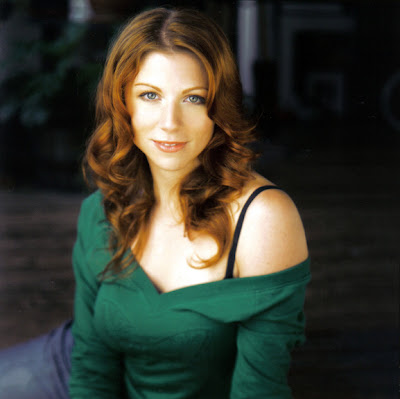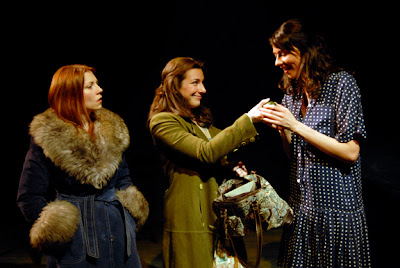1) What the fuck is going on?
Gawd knows! But if someone figures it out, please fill me in.
2) Do you think our culture perpetuates a false dichotomy between art and entertainment?
First, yes it is a false dichotomy. And secondly, I think every kind of art can be entertaining depending on the palate of the viewer, at least as far as my definition of entertainment goes.
Even if it’s a dark, conceptual, non-linear performance piece, if the audience is engaged and intrigued, there is entertainment in that. We equate ‘entertainment’ with mainstream commercial musicals or farce dinner theatre, but entertainment comes in all shapes and forms for different folks.
As far as Whale Music goes, for our inaugural production we chose to produce ‘art’ that we term ‘accessible’ – meaning a typically non-theatregoing crowd can attend and not feel alienated by a genre or style they didn’t understand – as the writing and tone of Whale Music is naturalistic and linear (for the most part).
Now, having said this, I do feel it’s important not to dumb down our audiences. But there’s something to be said for coming into a theatre after a long day at work and not having to ‘think’ too much in order to be engaged. This play is certainly good for that: it has a simple plotline, it’s sentimental and relationship-based and ideal for those who we’re trying to pull back into the theatres. We’ll work at conditioning them to new forms down the road!
3) As a producer, what was your biggest challenge in mounting Seventh Stage Theatre’ version of Whale Music?
Well . . . Aside from shortage of time, people-power and money?? Oh Indie Theatre . . . Clearly there are challenges with any new company on its first project. Who are these people? Are they any good? Why should we give them money? Why should we see their show?
And even if we’re known individually, as a whole Seventh Stage/Whale Music was brand spanking new. As with most things in life, you have to earn your keep and work your way up; it’s no different with theatre. Your spirit (and ego) can also get a bit worn down from shamelessly soliciting help from whomever you know, though in many cases people are happy to do it. I think we’ve just about emptied the universal favour bowl. At least now we have something to show for ourselves next time around, which will provide us more credibility.
4) Did your responsibilities as a producer ever conflict with your responsibilities as an actor on the project?
Absolutely. I wear the two hats pretty well generally speaking, but they definitely conflicted this time around, especially in the early stages of the rehearsal process. There was still so much producing work that needed to be done, and sticky stuff like dealing with adverts and sponsors and sales, that the pure stress of it – aside from the stress of being an actor taking on a big role – stole a portion of my required emotional actor energy.
Luckily, about halfway through I managed to get a lot off my plate AND simply resided to the fact that I had to let a few things go and drop a few balls at the producer end. C’est la! There are always sacrifices. But I will know what to do differently next time.
5) What do you like about your character in Whale Music?
Stella is a beautiful butterfly, stuck in a nasty cocoon of self-protection. If life runs in seven-year cycles, she’s coming to the end of one and has had just about enough. By the tender age of 27, life has dealt her some nasty cards and she’s gotten bitter far too early. But at the heart of her, she’s just dying to get out! There’s a soul tired of depression and just oozing to share and love and BE loved. Of course the fear being that getting close to anyone increases the chances of getting hurt, so instead she cuts herself off from the rest of the living world and drowns herself in booze, bad men and isolation.
I’ve certainly been there – and that’s why I like her. There’s no surprise why we’re drawn to certain roles. Luckily, however, for the sake of the character and the story, the women that Stella is faced with in Whale Music manage to slowly tear away the layers of the cocoon and allow that butterfly out! It’s really quite a wonderful journey to take as an actor.
 6) Is it surprising that a male writer, Anthony Minghella, was able to write such convincing “girl talk” between the all-female cast?
6) Is it surprising that a male writer, Anthony Minghella, was able to write such convincing “girl talk” between the all-female cast?
Yes and no.
Yes, because he’s just plain-old talented and clearly has amazing insight into humanity. He’s said himself he lives to observe and dissect people and then translate it to paper, which is exactly what he’s done here.
It also helped that he comes from a family of four sisters and a matriarchal grandmother who ran the roost, which would shed a lot of light of the female psyche.
Furthermore, he created this piece with a company of women who no doubt had a big role in transmitting all the “girl talk”.
No, because there are still some phenomenally masculine elements to the writing that pervade the script. I won’t get into it, but essentially our wonderful director, Rosemary Dunsmore, did an incredible job at ironing out some of the, dare I say, ‘weaknesses’ in the script. (It was his first after all!) She created transitions, cuts, inserts and text between lines that really helped the play’s fluidity and flow, allowing it to be as convincing as possible.
7 ) What is Seventh Stage Theatre looking for in its intern applicants?
Someone who LOVES theatre. ’Cause if you don’t, it’s too much work for too little money, baby! :) Obviously we’re looking for people with some background in theatre, those with any tech, computer or admin skills is a bonus. But really, anyone who believes in the company’s vision and mandate and wants to get their hands dirty can join the troops. There’s room for all! We’re new and growing and always open to new ideas and voices! Those who can execute on their visions are even better.
8) Do you think class barriers are preventing theatre from being a more vital part of Canadian culture?
Yes, it’s still seen as an elitist artform in many cases, aside from the fact that you can see great theatre for the same price or less than a movie. And, in fact, even most of the larger companies offer great rush or student discounts – but no one knows about them!
Outside the theatre community, theatre is often seen as stuffy and strange. I think archaic marketing and protocol contributes to deterring new and younger potential theatregoers (namely the 18-40 demographic). They don’t read papers, which is our traditional theatre advertising medium, and it’s not easy to get to or find out about.
I also think allowing food and beverages in theatres would help matters. I know we’re not all set up for cabaret and actors would have to put up with munching and crackling, but who cares! If it gets more bums in seats (and generates more money off liquor sales for theatres), then why not! There should also be connected afterparties and events to hook people in. Create a more social environment and event and I think we’ll draw a much wider and more interested crowd.
 9) Do you have a working definition of what it means to be an artist?
9) Do you have a working definition of what it means to be an artist?
No. Isn’t everyone an artist! Perhaps we don’t all do it for a living (and even professionals in this country challenge that notion), but all small children move when they hear music, draw when they have paint, play pretend for fun!
I think our artists simply get crushed or belittled to different degrees along the way, and some have more inclination towards keeping it alive and fostering it. A bit sentimental, I know, but I think there’s something very basic and human about the notion of ‘artist’.
10) What advice would you give to a new independent theatre company on how to develop its organizational structure?
Wow, I’m still working on mine.
Well, a company needs to decide if it’s going the commercial or not-for-profit route. In this country, I believe the latter works better, as you’re able to apply for grants, charitable status and be less owned by the views of investors or commercialism, one might say.
Get a lawyer and incorporate to protect yourself from liability. Make sure there’s at least one person with a marketing or PR background and at least one person with business and accounting experience. A group made up solely of artists without any of these skills will be lost. Harsh, but that’s the reality.
Gather a great group of people you trust and can fight with, because you will. There’s little room for politeness in this business and it’s so hard – especially at the beginning – that you have to have the space to be open and honest with each other.
Once you have your team, everyone needs to be very clear on what they want, what their limitations are, and what they can do. Then draft up contracts. Seriously. A little piece of paper and a handshake goes a long way! Follow it with beer and nachos and you’re good to go!

someone who can do publicity and someone who can do accounting or beer and nachos – what goes together better? toss up really.
Hey MJ,
Totally agree about getting someone with a passion for and knowledge of sound business-building practices involved in a new theatre company.
I’ve seen so many promising artist collective-y type things falter and stall because no one’s driving the business end of the deal.
My question is why more business-orientation professionals don’t see the appeal in becoming a part of the theatre community. How can we change our offering to make it more appealing to business leaders? As I see it, independent theatre is a totally underdeveloped market. How do we sell it to the the members of the business community? Cha-ching!
Ian